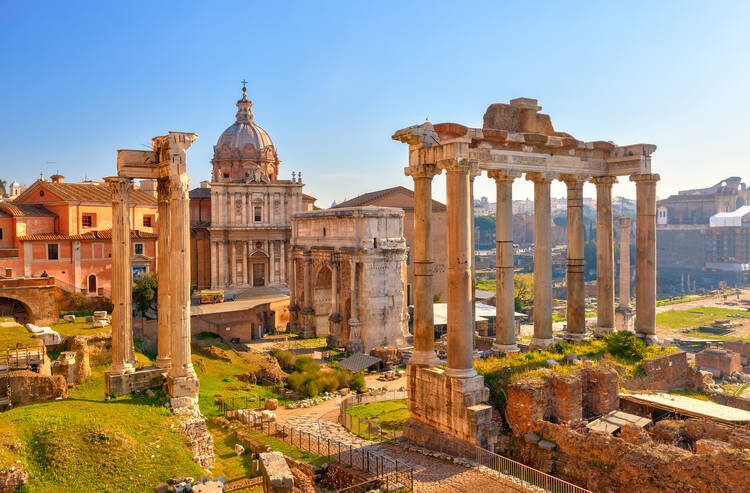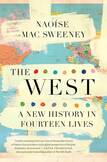Review: What we’re talking about when we talk about ‘Western Civilization’
Western civilization: Right-wingers want to save it; left-wingers say it is just a myth. Some see it as primarily racist or ecocidal, while others credit it with inventing human rights and democracy. For some, Western civilization is synonymous with Christianity; others see it as a secularizing force in the world. During the Cold War, “the West” meant the countries opposed to the Soviet Union. Meanwhile, the college course called “Western Civilization” often runs from Gilgamesh to Gorbachev, creating the impression that the West as we know it is 7,000 years old and gradually moved from the Tigris to the Thames. It is challenging to write a book against as amorphous a concept as the West, and perhaps that explains some of the difficulties I found in the classicist Naoíse Mac Sweeney’s book The West: A New History in Fourteen Lives.
Mac Sweeney tackles the history of the idea of the West through 14 portraits of both famous (Herodotus and Gladstone) and lesser-known historical figures (Phillis Wheatley and Tullia d’Aragona). These portraits are fascinating and instructive in their own right, particularly of those lesser-known figures. Whatever Phillis Wheatley’s relation to the West, her trans-Atlantic journeys, first as a captive on a slave ship and subsequently as a renowned poet, should be better known.
With these portraits, Mac Sweeney broadens our conception of the West, but that is not her main purpose. Instead, she wishes to dismantle the “grand narrative” of Western civilization because it is historically distorted and is likely to be used for racist or chauvinist politics today.
Although Mac Sweeney identifies a number of false claims about what Western civilization is, all these assertions seem to collapse into one main misconception: that ancient Greece, ancient Rome and modern Europe are part of a single coherent civilization. This is a myth. Mac Sweeney’s argument here is neither new nor controversial; Oswald Spengler noted as much 100 years ago. But Mac Sweeney has a popular audience in her sights. Many people believe that there was a direct transmission of democracy, individualism and rationalism from the ancient Greeks to the European Renaissance. These far-fetched origin tales are what Mac Sweeney has in mind when she takes aim at the “grand narrative” of the West.
If reasonable people agree that the ancients and modern Europe do not make up one civilization, then what do people actually mean by “Western civilization”? Here is where Mac Sweeney could spare us all significant uncertainty. If she had simply observed that people usually mean European civilization when they say Western civilization, it would clear up most of the confusion generated by the idea that Rome, Greece, Europe and Anglo-America are one coherent civilization. In this sense, those who say Western civilization is a myth are correct, but only semantically. Unlike “the West,” European civilization is a coherent concept—even if, like any concept, it does not fully capture reality. In the Middle Ages (500-1450), a socially, culturally and economically coherent civilization emerged in Central and Western Europe, most accurately called Latin Christendom. This civilization was a new synthesis of Germanic, Celtic, Roman and Christian elements.
The influence of European civilization went global in the 1400s and 1500s via exploration and colonization. Because settler colonization in North America destroyed Native civilizations in less densely populated regions, the settlers could recreate an approximation of their European life. For these reasons, the United States and other former settler colonies are often included in Western civilization even though they are distinct from Europe. Nevertheless, it would be more accurate to simply say European civilization even when referring to these former settler colonies because they share much of what makes Europe distinct.
Like all civilizations, European civilization has been a mixed blessing, to say the least. Mac Sweeney deftly chooses certain figures to highlight key moments when history might have turned out differently. She chooses the Arab Muslim philosopher al-Kindi to demonstrate how Muslim civilization directly inherited and developed Greek philosophy and science when Latin Christendom was a backwater.
It wasn’t inevitable that Europe would develop modern science and rationalism. Medieval Western and Central Europe gradually defined itself significantly, if not entirely, against Islam. But this didn’t have to continue. Mac Sweeney reminds us that during the Reformation, England tried to forge an alliance with the Ottoman Turks against Catholic Europe and that Dutch Protestants rallied to the slogan, “better Turk than papist.”
Similarly, in a fine chapter on the Byzantine emperor Theodore II Laskaris, Mac Sweeney shows how the Crusades further alienated the Byzantines when they might have provided a chance to bring Latin and Greek Christians together. All of these “might have beens” serve to remind us that history is contingent and that Europe could have taken other paths to the present, including a less imperialist and racist one.
Yet, if European civilization is not better than other civilizations, that does not mean it isn’t different. And some of what makes it different is worth sharing with the rest of the world. As the work of the medievalists Brian Tierney and Francis Oakley shows, many of the most particular characteristics of European civilization—limited government, a distinction between politics and religion, the elevated social status of women (relative to other civilizations), and belief in the compatibility of faith and reason—emerged within Latin Christendom in the Middle Ages.
Limited government originally meant constraints on royal and imperial power, allowing for the freedom of the church. Limited government was transformed by parliaments, constitutions and revolutions over the centuries into what we call liberalism (freedom from arbitrary power) today.
Mac Sweeney is no postmodernist. While she tears down the grand narrative of Western civilization because it was used to justify European imperialism in the past and is used to justify racism today, she wants to replace it with another narrative, both diverse and dynamic, that aligns with liberal, pluralist values. Mac Sweeney hopes that this new narrative will be more historically accurate, but she also recognizes that no grand narrative can ever tell the whole story; nevertheless, she acknowledges that some story will have to emerge to take the grand narrative’s place.
Stories and institutions (dare we say traditions?) are necessary to pass on our values. Just like the old story of the West, the new story will have to answer the questions: Who are we and what do we value? History cannot answer these questions, but we must.











